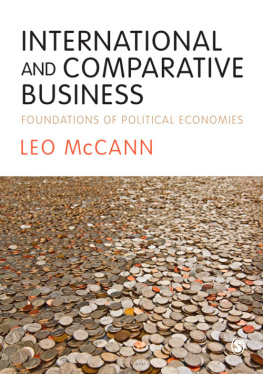

SAGE has been part of the global academic community since 1965, supporting high quality research and learning that transforms society and our understanding of individuals, groups and cultures. SAGE is the independent, innovative,
natural home for authors, editors and societies who share our commitment and passion for the social sciences.
Find out more at: www.sagepublications.com


Leo McCann 2014
First published in 2014
Apart from any fair dealing for the purposes of research or private study, or criticism or review, as permitted under the Copyright, Designs and Patents Act, 1988, this publication may be reproduced, stored or transmitted in any form, or by any means, only with the prior permission in writing of the publishers, or in the case of reprographic reproduction, in accordance with the terms of licences issued by the Copyright Licensing Agency. Enquiries concerning reproduction outside those terms should be sent to the publishers.
Library of Congress Control Number: 2013936836
British Library Cataloguing in Publication data
A catalogue record for this book is available fromthe British Library
ISBN 9781-412948753
ISBN 9781-412948760 (pbk)

SAGE Publications Ltd
1 Olivers Yard
55 City Road
London EC1Y 1SP
SAGE Publications Inc.
2455 Teller Road
Thousand Oaks, California 91320
SAGE Publications India Pvt Ltd
B 1/I 1 Mohan Cooperative Industrial Area
Mathura Road
New Delhi 110 044
SAGE Publications Asia-Pacific Pte Ltd
3 Church Street
#10-04 Samsung Hub
Singapore 049483
Editor: Matthew Waters
Editorial assistant: Nina Smith
Production editor: Sarah Cooke
Copyeditor: Jeremy Toynbee
Proofreader: Katherine Haw
Marketing manager: Alison Borg
Cover design: Lisa Harper
Typeset by: C&M Digitals (P) Ltd, Chennai, India
Printed in Great Britain by Henry Ling Limited, at the Dorset Press, Dorchester, DT1 1HD

For Ruby and Max
Contents
About the Author
Dr Leo McCann is Senior Lecturer in International and Comparative Management at Manchester Business School. His research and teaching focuses on the impacts of large-scale economic change on work and organization across numerous countries. He has written many articles on the subject of the international transformation of white-collar work in journals such as Journal of Management Studies, Human Relations, and Organization Studies. He is the co-author of Managing in the Modern Corporation (Cambridge University Press, 2009). His research draws on the paradigms of sociology of work, varieties of capitalism, and political economy, exploring how large-scale global transformations are translated through national institutional structures with often profound effects on the everyday lives of organizations, managers, workers and citizens. The present volume is his first textbook, based on over a decade of experience teaching and researching comparative capitalism, globalization, and the restructuring of organizations and work.
Prologue
Tkaid Shinkansen, approaching Shin-saka station, Japan
The carriage is a picture of calm. There is barely any noticeable vibration or rocking as the train slides along its dedicated high-speed tracks. The electric hum of the engines is muted and unobtrusive. Somehow it is even pleasing to the ear, contributing to a sense of forward flow. This is high-speed travel as art form. The intense light and sound of Japanese urban life cannot penetrate the cocoon. Instead the neon and concrete flashing past the windows serve as a colourful backdrop. Many passengers have pulled the sun-shutters down to block it completely. The train is quiet, tidy, clean and spacious. The interior colour scheme of dull whites, silvers and pastels is impeccably neat and tidy. The whole scene is beautifully organized but dull, somehow empty and clinical.
The old-fashioned uniform and extremely polite bowing of the ticket inspector hints at traditional notions of hierarchy, stability and authority. He has probably been employed by Japan Rail all of his working life. The passengers are quiet and orderly. Cellular phone networks work well, meaning there is no need for passengers to speak loudly or repeatedly call back when the signal drops. In fact, when they do talk, they move into the vestibule area, speaking in hushed tones, covering their mouths so as not to create undue noise. Theres even a Silence Car, in which not only are calls forbidden, but so is talking to other passengers and the public address system is switched off. Many of the passengers are men in suits the salarymen rank and file of giant Japanese corporations and public bureaucracies. Several of them are asleep, slumped into reclining chairs; an indication of the uncompromising pace, intensity and length of Japanese office days. If they need a boost they could purchase a drink from the young saleswoman who wears an old-fashioned apron tied with a bow and calls out her items for sale in a sing-song, exaggeratedly girlish manner.
***
East Midlands Trains LiverpoolNorwich service, arriving at Manchester Oxford Road, UK
The carriage overflows with humanity. The old, ugly trains diesel engines grumble, vibrate and belch filthy fumes. The service seems to be running around 10 minutes late but there is no announcement or apology. The outside of the train looks odd. It is made of four carriages the front two feature the new colour-scheme of maroon and gold but the trailing section is coloured green and blue. The muddled colour schemes point to the frequent changes of train companies that have operated this franchise. Neither of the colour schemes match the uniforms of the staff. The catering staff uniform bears the slogan Innovation but there is scant evidence of newness or invention in the products on offer. Besides, the overcrowding is so severe that the trolley cannot advance down the train and it remains rooted at one end. People talk loudly into mobile phones, which regularly cut out as the network coverage fades. There is a lot of noise. There is also a tremendous mix of ethnicities and an apparently broad gender balance; several women are making business calls, tapping on laptops, checking emails. Many passengers appear to be international migrants, such as the dozens of Chinese students travelling between the several university cities on the line.
***
My simple comparison of two train journeys would be a grossly unfair one if I tried to generalize from it. Many other services in Britain are far better than this particular line, including some that run on upgraded, high-speed electric lines. Many services in Japan are notoriously overcrowded, and the speed and comfort of the local services at the bottom of Japans hierarchy of train transport compare poorly to those of the Shinkansen at its summit. The Shinkansen has been a symbol of Japanese modernity for many years (Hood 2006). Some of the trains have been emblazoned with the slogan AMBITIOUS JAPAN! across the cars (in English). This train system is widely regarded as a phenomenal success, and one that reflects well on the country and the various government bureaucracies and domestic industrial giant firms that planned, built and run it. Japanese railways have a reputation as being possibly the best managed, most safely operated and most heavily used systems in the world.
Next page

















